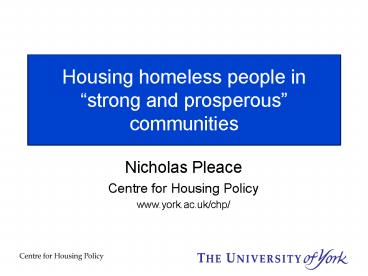Housing homeless people in strong and prosperous communities - PowerPoint PPT Presentation
1 / 14
Title:
Housing homeless people in strong and prosperous communities
Description:
Web-based survey of housing associations ... Housing associations housed around one third of all statutorily homeless households ... – PowerPoint PPT presentation
Number of Views:47
Avg rating:3.0/5.0
Title: Housing homeless people in strong and prosperous communities
1
Housing homeless people in strong and
prosperous communities
- Nicholas Pleace
- Centre for Housing Policy
- www.york.ac.uk/chp/
2
Strong and prosperous communities
- Social rented sector in England increasingly
being managed by third sector housing
associations - An emphasis on developing mixed and strong
communities in social housing - minimising spatial concentrations of poverty
- to avoid cultures of worklessness
- to promote opportunity/ minimise social problems
3
Housing the homeless
- Housing associations are expected, though not
required, to take an active role in housing
statutorily homeless households - These households are characterised by
socioeconomic marginalisation - And in some cases have characteristics that make
them difficult to manage
4
Fears of a policy tension
- Government became increasingly concerned that
housing associations were avoiding management
problems - And pursuing goal of mixed, strong communities
- By excluding some homeless groups from their
housing
5
The research
- Review and comparison of national level datasets
- Web-based survey of all local authorities which
administer homelessness system - Web-based survey of housing associations
- Detailed case study work in London, Birmingham,
Bristol, Liverpool, Norfolk and Hertfordshire
6
Findings Statistics
- Housing associations housed around one third of
all statutorily homeless households - Particularly active in areas where they manage
what was local authority stock - But considerable proportional variation in
housing association activity - between similar areas
- between similar associations
7
Findings Statistics
- Suggested discrepancy, inconsistency
- Which in turn suggested bias from some housing
associations - Variation not explained by
- Level of homelessness
- Size and nature of housing associations or
housing association sector - Pools of homeless households in temporary
accommodation
8
Findings Survey
- Local authorities and housing associations both
said that housing associations were less likely
to house following groups - People with history of anti-social behaviour
- Or poor tenancy records
- Unmet support needs
- Criminal records
- Current unemployment (smaller numbers)
9
Findings Fieldwork
- Housing association and local authority
respondents talked openly of tension between
providing housing to homeless people - And maintaining mixed and strong communities
10
Findings Fieldwork
- Single people households, especially male, as
there is almost always a problem there must be
for them to be accepted as homeless in the first
place (housing association respondent)
11
Findings Fieldwork
- I know that the politics are with a big and small
p here, but if you start putting people in one
area because theyre hard to let then that is not
the way to deal with homeless people. Its a case
then of disturbing the community, you need a
balanced community. If we are getting
homelessness applicants all the time through the
nominations and if we have only a small estate in
an area, it will gradually fill up with those
people and become difficult to manage, difficult
and expensive to maintain and in effect its not
what social housing is about. Its about giving
people decent homes not just pushing them into
places where they dont want to go and dont want
to stay (housing association respondent).
12
Conclusions
- Housing associations could not reconcile housing
statutorily homeless households with pursuit of
mixed communities - Wanted cohesive, quiet communities that were
easily managed - As did their tenants
- They were excluding homeless people on this basis
13
Conclusions
- But problem not straightforward
- Clearly housing associations have to have these
concerns - There are worries about spatial concentration of
poverty and high cost, high risk populations
14
Conclusions
- Can individual and household level interventions
counter these risks? - Limited success of these services
- Where do these excluded populations go?
- Restrictions on access to other tenures
- Precarious arrangements, temporary accommodation,
potentially even street homelessness?































